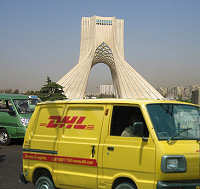 If sometime mid-morning you heard a loud cheer followed by exclamations of “It’s about time!”, what you heard was small to middle-market exporters cheering the announcement of a settlement agreement between DHL and two federal export agencies, the Bureau of Industry and Security (“BIS”) and the Office of Foreign Assets Control (“OFAC’). Under the Settlement Agreement, DHL agreed to pay to the two agencies $9.44 million in penalties for allegations that DHL unlawfully aided and abetted the illegal exportation of goods to Syria, Iran and Sudan and failed to comply with record keeping requirements of the Export Administration Regulations and OFAC regulations. OFAC specifically alleged “thousands” of shipments by DHL to Iran and Sudan.
If sometime mid-morning you heard a loud cheer followed by exclamations of “It’s about time!”, what you heard was small to middle-market exporters cheering the announcement of a settlement agreement between DHL and two federal export agencies, the Bureau of Industry and Security (“BIS”) and the Office of Foreign Assets Control (“OFAC’). Under the Settlement Agreement, DHL agreed to pay to the two agencies $9.44 million in penalties for allegations that DHL unlawfully aided and abetted the illegal exportation of goods to Syria, Iran and Sudan and failed to comply with record keeping requirements of the Export Administration Regulations and OFAC regulations. OFAC specifically alleged “thousands” of shipments by DHL to Iran and Sudan.
The reason for this sudden eruption of schadenfreude among some sectors of the export community is that many exporters have relied on companies like DHL to assist them through the regulatory thickets of exporting from the U.S only to find that these companies failed to comply with all the requirements. The results of this non-compliance are voluntary disclosures made, and fines paid, by the exporters while the freight forwarders like DHL get off scot free. Too many exporters, particularly those without a large number of export transactions, are forced to rely on DHL and others to lodge licenses, make AES entries, handle endorsements of the license to decrement the value of the license, and so forth. And when that isn’t properly done, it’s often the exporters that pay the price.
Another interesting part of the DHL settlement is that, according to the OFAC press release,
Many of the shipments were intercepted and reported to OFAC by the U.S. Department of Homeland Security’s Customs and Border Protection (CBP)
Say what? This means that DHL was sending packages out of the country where the destination on the air waybill was Iran or Sudan or another sanctioned country. How on earth could that have happened? I think the only reasonable conclusion is that DHL’s employees only used the company’s compliance program when they tore out pages to make paper airplanes to throw down the hall. I’m kidding, of course, but you do have to wonder how DHL could show up at the border with packages headed to Iran, Syria and Sudan.
In better news for DHL, the Jamaica Exporter’s Association today awarded DHL its annual prize as the “best-in-class transportation company that enables and supports the growth of Jamaica’s export industry.” Have a Red Stripe, fellows. You not only deserve it, you probably need it too!
UPDATE: Here is the link to settlement documents.
[NOTE: the photograph illustrating this post is not an actual photo taken in Tehran but a humorous illustration created through the magic of image-editing software.]

 Posted by
Posted by  Category:
Category: 

 The Office of Foreign Assets Control (“OFAC”) released last Friday its
The Office of Foreign Assets Control (“OFAC”) released last Friday its 

